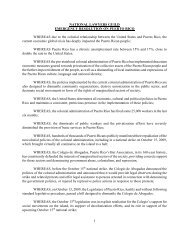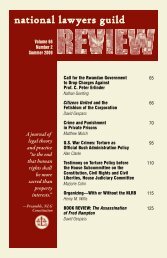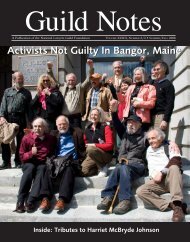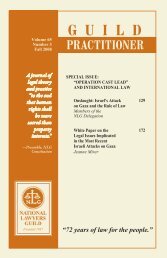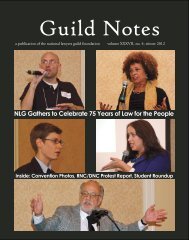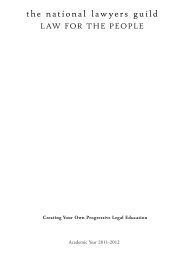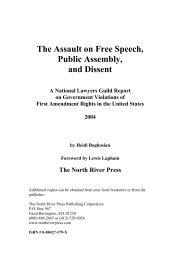NLGRev 68-2[1].indd - National Lawyers Guild
NLGRev 68-2[1].indd - National Lawyers Guild
NLGRev 68-2[1].indd - National Lawyers Guild
You also want an ePaper? Increase the reach of your titles
YUMPU automatically turns print PDFs into web optimized ePapers that Google loves.
82 national lawyers guild review<br />
further than the Furundzija Tribunal by discussing factors other than coercion<br />
or force that would render sex as rape. The underlying legal principle,<br />
it explained, was that sexual penetration is rape if it is not truly voluntary<br />
or consensual on the part of the victim, which goes beyond only looking at<br />
force but also looking at the issue of sexual autonomy. Sexual autonomy is<br />
violated whenever the person has not freely agreed to it or is otherwise not<br />
a voluntary participant. 135 Prostituted women continually say they have no<br />
ability to control whom they must service or which acts they must perform.<br />
In fact, they have less control in legalized brothels than on the street.<br />
The absence of consent or voluntary participation was also discussed in<br />
Dragoljub. 136 Looking at the circumstances that define the vulnerability or<br />
deception of the victim, the Court concluded that the common denominator<br />
was that the perpetrator overcame the victim’s will or negated her ability to<br />
freely refuse sexual acts—temporarily or permanently. 137 It found that alleged<br />
consent is not a defense under the Rules of Procedure 138 because no person<br />
can consent to be a victim of crime. The opinion urged that the focus must<br />
remain on the criminal act, not on the behavior of the victim. Prostituted<br />
women are “seasoned” by beatings and rapes, deprived of their identification<br />
documents, left naked, locked in rooms until they learn that they have no<br />
hope of escape. Capitulation of the victim cannot be construed as “consent.”<br />
The European Court of Human Rights The European Court of Human<br />
Rights (ECtHR) has established that filthy conditions, water shortages, skin<br />
infections, and sleep deprivation can constitute torture when the suffering is<br />
intense. Likewise, when the government refuses to intervene, it is systematically<br />
facilitating torture, and should be held liable under the Convention. 139<br />
Many women in prostitution report such conditions. In places where prostitution<br />
is legalized, the state not only ignores the conditions, it legitimizes<br />
them. Therefore, States must be held accountable under ECtHR for their<br />
failure to eradicate torture.<br />
In Siliadin v. France, 140 the ECtHR held that there had been a violation<br />
of Article 4 of the European Convention of Human Rights’ prohibition of<br />
servitude. The victim was a Totolese national who was brought to Paris at<br />
fifteen to do domestic work but who became an unpaid servant when her<br />
passport was confiscated. 141 The couple controlling her was first convicted,<br />
then acquitted on appeal, and then convicted again of making the victim work<br />
for them without pay. 142 However, the Court found that her working and living<br />
conditions were incompatible with human dignity. 143<br />
This decision was taken to the ECtHR as violating Article 4 against forced<br />
or compulsory labor. Given that the vast majority of women are coerced<br />
into prostitution and 92 percent of prostituted women seek to escape, one


![NLGRev 68-2[1].indd - National Lawyers Guild](https://img.yumpu.com/30820772/20/500x640/nlgrev-68-21indd-national-lawyers-guild.jpg)


